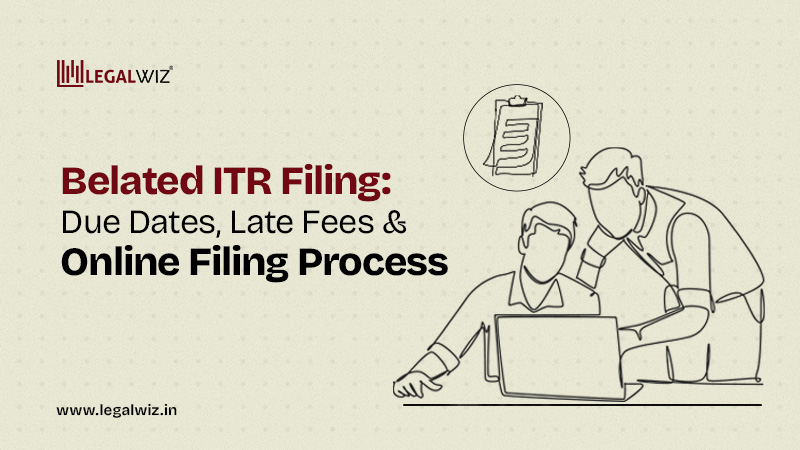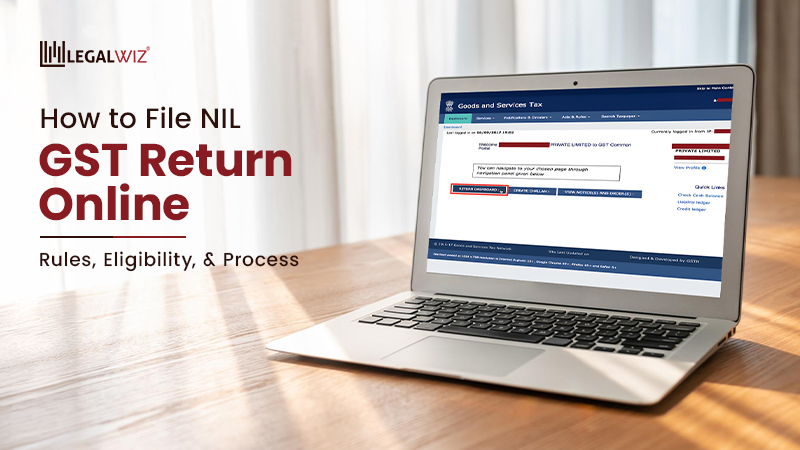Belated ITR Filing: Due Dates, Late Fees & Online Filing Process
Missed the ITR Deadline? Act Now Before It’s Too Late!
There’s still time to fix it—but the window’s closing fast.
So, the due date came and went, and your Income Tax Return (ITR) is still on your to-do list? Relax—you’re not alone. Every year, thousands of taxpayers miss the ITR deadline due to last-minute document hunts, technical glitches, or sheer forgetfulness.
But here’s the truth bomb: late filing isn’t free. The tax department charges penalties, interest, and can even restrict your ability to claim certain benefits.
The good news? You can still file a belated ITR under Section 139(4) and avoid heavier penalties if you act fast.
Missed deadlines before? Check out our ITR filing due dates guide for 2025 and stay ahead this year.
In this blog, we’ll explain what a belated return is, the cost of filing late, and the simplest way to get it done before time really runs out.
What is a Belated ITR? (Section 139(4) Explained)
A belated ITR, under Section 139(4), is an Income Tax Return filed after the due date but before the final deadline of the assessment year. Think of it as a “late entry pass” from the tax department, allowing you to file late, but often with penalties and limited tax benefits.
If you’ve made mistakes while filing your ITR, you can still fix them by filing an updated ITR (ITR-U). Read our post on a complete guide on ITR-U: What is ITR – U?
Regular ITR vs Belated ITR – What’s the Difference?
- Regular ITR: Filed on or before the due date (usually 31st July for individuals).
- Belated ITR: Filed after the due date but before the final deadline under Section 139(4). The process is similar, but you might lose certain benefits (like carrying forward losses) and pay late fees under Section 234F.
| Feature | Regular ITR | Belated ITR |
| Filing timeline | Before the due date | After the due date but before the final date |
| Late fees (234F) | Nil | ₹1,000 – ₹5,000 |
| Carry forward of losses | Allowed | Not allowed (except house property loss) |
Who Can File a Belated Return?
Any individual, salaried person, freelancer, or business owner who missed the initial deadline but still needs to report their income can file a belated return. Even NRIs and taxpayers with tax-deductible income can file a belated ITR to stay compliant.
But remember, choosing the right form is key before you file late. Check out our guide on different ITR forms and their applicability to avoid mistakes.
Deadlines for Belated ITR – AY 2025–26
For the financial year 2024–25 (AY 2025–26):
- Original due date: 15th September 2025 (for most individual taxpayers).
- Belated ITR last date: 31st December 2025 (3 months before the end of the assessment year).
Miss this second chance, and you lose the option to file your return altogether (unless you get a notice or file under updated ITR rules).
The Cost of Filing Late ITR: Penalties and Interest Charges
Filing your Income Tax Return late isn’t just about a ticking clock; it can also pinch your wallet. The Income Tax Department imposes penalties, interest, and loss of benefits if you delay beyond the due date.
Want to save more on taxes next year? Read our complete guide on tax deductions and saving strategies.
Late Filing Fee – Section 234F
The tax department charges a fixed late filing fee based on your total taxable income:
| Total Income (AY 2025–26) | ITR Filing Date | Late Filing Fee (₹) |
| Up to ₹3 lakh | Any time before the deadline | No fee |
| Up to ₹7 lakh | After the due date till 31 Dec 25 | ₹1,000 |
| Above ₹7 lakh | After the due date till 31 Dec 25 | ₹5,000 |
(Note: These fees apply even if you have already paid your taxes but are just filing late.)
Interest Charges – Section 234A
If you had unpaid taxes when the deadline passed, you’ll also pay simple interest at 1% per month (or part thereof) from the due date until the actual filing date.
Example: If you owed ₹10,000 in taxes and filed 3 months late, interest = ₹300 in addition to the late fee.
Loss of Benefits
Filing late doesn’t just cost money upfront—it can cost you future savings too:
- You cannot carry forward certain losses (like capital losses) to offset future gains.
- Interest on refunds may be reduced or lost if you delay filing.
Pro tip: File even a zero-tax return before the deadline. It keeps your financial record clean and prevents unnecessary penalties.
Can You Still File ITR After the Deadline? (Time Limits You Must Know)
Missed the original ITR deadline? Don’t hit the panic button yet—the Income Tax Department gives you a second chance called belated ITR filing. But just like Cinderella’s clock, this chance also runs out.
Final Date to File a Belated ITR
For Financial Year 2024–25 (AY 2025–26), you can still file your return late until:
- 31st December 2025 – This is the cut-off date for belated returns under Section 139(4).
After this date, the tax portal won’t accept your return unless you file an updated ITR (Section 139(8A)) within the next two years, and that often comes with heavier penalties.
Situations Where a Belated Return Cannot Be Filed
- If you miss the 31st December deadline of the assessment year.
- If you are required to file ITR under notice from the department, but fail to respond on time.
- If your income is subject to special audits or assessments, late returns are not accepted.
What If You Miss the Belated ITR Deadline Too?
Failing to file by 31st December can lead to:
- Mandatory penalty notices or prosecution for non-compliance.
- Inability to claim refunds for excess taxes paid.
- Permanent loss of carry-forward benefits, affecting future tax savings.
- Potential difficulties in loan approvals, visa processing, or financial background checks, as you won’t have a valid ITR.
Pro tip: Filing a belated ITR is far better than skipping it altogether. Even if penalties apply, you stay compliant and avoid serious legal trouble later.
Step-by-Step Guide: How to File a Belated ITR Online
Filing a belated ITR isn’t rocket science; it’s almost the same as a regular return, just with an added penalty. Here’s how to do it smoothly:
Step 1: Log in to the Income Tax Portal
- Visit incometax.gov.in and sign in using your PAN (User ID), password, and Captcha code.
- If you’re new, register yourself before proceeding.
Step 2: Choose the Correct ITR Form
- Match your form to your income: Pick the ITR form that best fits your earning style.
- Salaried persons: Usually file ITR-1 or ITR-2 for a smooth ride.
Step 3: Fill in the Required Details
- Provide your personal details, income, tax deductions, and TDS information accurately.
- Cross-verify Form 16, Form 26AS, and AIS data to ensure there are no mismatches that could trigger notices later.
Step 4: Pay Outstanding Tax + Interest (If Any)
- If you have unpaid taxes, calculate the self-assessment tax and pay it before submitting the belated ITR.
- Interest under Section 234A and penalty under 234F will automatically be included in your computation.
Step 5: Submit and E-Verify Your Return
- Once done, submit the ITR online.
- Complete e-verification immediately using:
- Aadhaar OTP
Net banking
- Digital Signature Certificate (DSC)
- Aadhaar OTP
- Without verification, your ITR will not be considered valid.
Filing early—even if late—reduces interest charges and keeps your refund (if any) from getting delayed.
Tips to Avoid Penalties in the Future
Filing a belated ITR once is forgivable, but repeating it? That’s like paying “lazy tax” every year.
Here’s how to stay ahead of deadlines and save your hard-earned money:
| Tip | What to Do | Why It Helps |
| File before due date | Submit ITR by 15th Sep (or applicable deadline) | Avoids late fees under Section 234F and keeps tax records clean |
| Keep documents ready | Collect Form 16, 26AS, AIS, and deduction proofs early | Prevents last-minute delays and missing information |
| Use online tools or expert help | File via trusted portals or consult a CA | Reduces errors, avoids notices, ensures accurate filing |
| Pay advance tax (if liable) | Make quarterly payments on time | Cuts down interest under Section 234A & 234B for unpaid taxes |
Set a tax reminder on your phone for July every year. A 10-second alert could save you thousands in penalties.
Final Thoughts: Don’t Let Deadlines Tax Your Peace of Mind
Filing your ITR late once is a lesson. Doing it every year is an expensive habit. Deadlines may seem like just dates on a calendar, but missing them costs you hard-earned money, future tax benefits, and sometimes even peace of mind.
The good news? You don’t have to tackle the tax maze alone.
Pro Tip: The smartest move isn’t just filing on time, it’s filing right and on time with expert guidance.
File Your ITR Stress-Free with LegalWiz.in
Avoid penalties, interest, and sleepless nights. Get your taxes filed accurately and on time by professionals who make compliance hassle-free.
Click here to file your ITR now with LegalWiz.in.
Frequently Asked Questions
Can I revise a belated ITR?
Yes! From AY 2021–22 onwards, even belated returns can be revised before 31st December of the assessment year. So, if you spot an error, you can fix it—just don’t miss the final cut-off date.
What if I miss even the belated deadline?
If you fail to file before 31st December, you lose your chance to file a regular return. The only option left is to submit an updated ITR (u/s 139(8A)) within 2 years, usually with higher penalties and interest.
Can I claim deductions and refunds in a belated return?
Yes, you can claim most deductions under Chapter VI-A (like 80C, 80D) and refunds. But the longer you delay filing, the more likely your refund interest reduces. Some deductions and carry-forward benefits (like capital losses) are lost if you file late.
Do salaried individuals also pay late fees?
Absolutely. If your total income is above ₹2.5 lakh, a late filing fee under Section 234F applies—even if your employer already deducted full tax via TDS.
Is belated ITR filing possible offline?
Mostly, belated returns are filed online via the income tax portal. Offline (paper-based) filing is allowed only for very limited categories of taxpayers, such as super-senior citizens or cases where the department specifically permits manual submission.

Sapna Mane
Sapna Mane is a skilled content writer at LegalWiz.in with years of cross-industry experience and a flair for turning legal, tax, and compliance chaos into clear, scroll-stopping content. She makes sense of India’s ever-changing rules—so you don’t have to Google everything twice.







